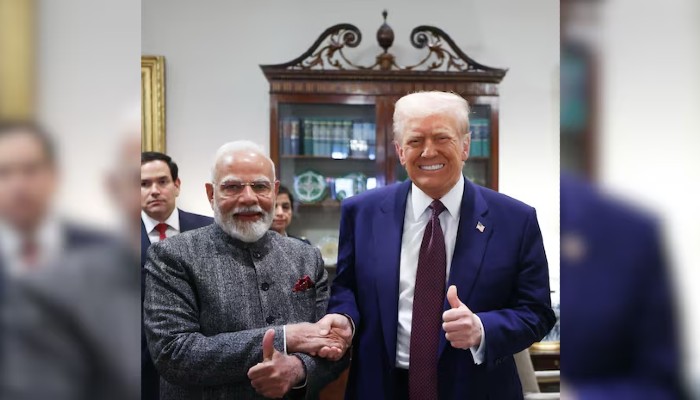India-US Trade Deal: Trump Claims ‘Zero Tariffs’ as Jaishankar Urges Caution

Representative Image
US President Donald Trump claims India offered zero tariffs on American goods. India responds, calling the remarks premature amid ongoing trade negotiations.
Trump makes bold tariff claim ahead of trade talks
Speaking at a business event in Doha during a three-nation tour of the Middle East, US President Donald Trump said India had proposed a trade deal under which American goods would be exempt from all tariffs. “It’s very hard to sell in India, and they are offering us a deal where basically they are willing to literally charge us no tariffs,” he said.
The remarks came just days before Indian Commerce and Industry Minister Piyush Goyal and a delegation of top negotiators are scheduled to meet their American counterparts in Washington to advance bilateral trade talks. The discussions are part of a broader effort to strengthen economic ties between the two countries.
India responds with caution
India’s External Affairs Minister Subrahmanyam Jaishankar responded pointedly, though without naming Trump directly. “Any trade deal has to be mutually beneficial. It has to work for both countries. That would be our expectation from any trade deal,” he told reporters on Thursday. “Until that is done, any judgement will be premature.”
Dr Jaishankar also noted the complexity of the negotiations. “Nothing is decided till everything is,” he added, stressing the importance of a comprehensive and balanced outcome.
Concerns over Apple manufacturing shift
President Trump also used the occasion to express dissatisfaction with Apple Inc.'s strategy to shift more of its manufacturing operations from China to India. Recounting a conversation with Apple CEO Tim Cook, Trump said, “I told him, Tim, we treated you very good… We’re not interested in you building in India. India can take care of themselves.”
Apple has reportedly accelerated plans to manufacture all iPhones intended for the US market in India by the end of 2026. The move is seen as part of the company’s efforts to mitigate risks from rising US-China trade tensions and anticipated tariffs. In March, Apple’s Indian suppliers, including Foxconn and Tata, shipped nearly $2 billion worth of iPhones to the United States—a record volume aimed at bypassing new US import duties.
Trade deal still under negotiation
India has not confirmed Trump’s claim of a zero-tariff offer. However, according to Reuters, New Delhi has proposed a phased agreement under which tariffs would be eliminated on 60 percent of goods, while offering preferential access to nearly 90 percent of merchandise imported from the US.
Indian officials have reiterated that any final agreement will prioritise national interests, including sensitive sectors like agriculture. Government sources cited by Indian media have indicated that negotiations remain ongoing and warned against premature conclusions.
Markets react, but caution remains
News of Trump’s remarks prompted a rally in Indian equity markets, with indexes reaching a seven-month high. Observers viewed this as a sign of optimism regarding the potential deal. Nonetheless, Minister Goyal previously cautioned that India would not be rushed into an agreement. “We never negotiate at gunpoint,” he said, adding that negotiations are being pursued in the “spirit of India First”.
Goyal also reiterated the government’s long-term economic vision, stating that all trade agreements must support India’s goal of becoming a developed nation—referred to as "Viksit Bharat"—by 2047.
India-US trade: a growing relationship
The United States is India’s largest trading partner, with bilateral trade reaching $129 billion in 2024. India currently enjoys a trade surplus of approximately $45.7 billion. Both governments have set an ambitious goal to expand bilateral trade to $500 billion by 2030.
Trump’s claim comes during a 90-day pause on “reciprocal tariffs” announced earlier this year. The temporary suspension offers a limited window to secure a breakthrough, although experts note that political and economic complexities remain.
Context: Trade tensions and policy shifts
President Trump has frequently criticised India’s trade policies, citing high tariffs on a range of goods including dairy, automobiles, and agricultural products. During his previous term, the US revoked India’s preferential trade status under the Generalised System of Preferences (GSP) programme, citing lack of reciprocal access.
India, in turn, has occasionally responded with retaliatory duties. In recent years, however, both nations have attempted to reset ties, recognising the strategic importance of their economic and geopolitical partnership.
While Trump’s zero-tariff statement has stirred headlines, Indian officials maintain that real progress will only be evident once formal agreements are signed. Until then, both sides are expected to continue discussions aimed at balancing market access, investment incentives, and national interests.

Reliance Retail acquires Kelvinator, The Coolest One
Reliance Retail has purchased the Kelvinator brand from Electrolux for nearly ₹160 crore, aiming to strengthen its position in India's consumer durables market.
| 2025-07-19

Saiyyara has shattered every myth about launching newcomers. No big names, no big PR
Madhur Bhandarkar praises debut film 'Saiyaara' for its raw talent and storytelling, marking a shift in Bollywood's approach to newcomers.
| 2025-07-19

India slams reports blaming pilots for Air India crash
India's AAIB disputes US media assertions regarding Air India AI 171 crash, highlighting ongoing investigation and sensitivity towards victims' families.
| 2025-07-18

India Secures Four-Wicket Win in ODI Series Opener Against England
India achieves a four-wicket victory over England in the ODI series opener, led by Deepti Sharma's unbeaten 62 runs.
| 2025-07-17

Air India inspection claims no problems found with Boeing 787 fuel control switches
Air India has conducted thorough inspections of its Boeing 787 fuel control switches, reporting no problems following a DGCA directive.
| 2025-07-17




